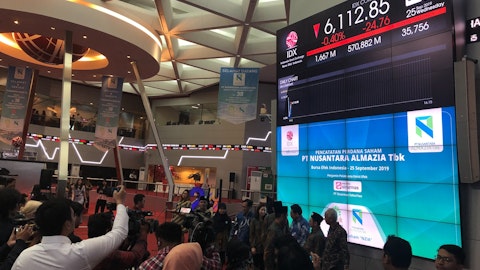Jeff Jones: You got it. Let me try to break that down a bit and keep me honest If I miss a piece of the puzzle. I mean just starting at the highest level, we know that the brand H&R Block has tremendous assistance and we know that people know that we have tax pros in locations. What they don’t know is that we offer a DIY software products, they don’t know that to the same degree. So our allocation this year is skewed more than in the past to DIY messaging. And over the summer, we did a lot of research to understand why had we been growing revenue and volume and new clients in DIY but not market share in DIY and there were three real reasons, number one, far and away number one was the lack of awareness that we offered the product broadly.
Number two was a misunderstanding about how easy it is to switch and number three, is about pricing and a little bit about the actual price, bit more about the frustration that comes when you’re surprised by what you’re charged when you get to the end of the process. And so we’ve really gone out of three of those head on. You see it reflected in television really top of the funnel, as we think, building awareness but we are more active than usual in digital channels, really delivering the details about the value proposition and then once you arrive at the website, having built a custom flow, particularly for TurboTax switchers to really educate them on how easy it is to switch video content to teach the filers how to find your TurboTax return and upload it to Block, so a number of things, very specifically to really go at those exact barriers that we understood clearly from clients from the summer.
Scott Schneeberger: Thanks, Jeff. Appreciate it. You did a great job, as you say, getting all the pieces of the puzzle there on the multi-part question. Just a follow-up on that with the one piece I think we missed was just, was there more overall marketing dollar spend? Or was it relatively in line with last year or a normal increase? And then a follow-up on that, just on the same topic, is this the AI driven technology that you’ve highlighted? How differentiated is that in the industry, clearly you’re promoting it a lot? But is it truly differentiated? Or your peers, they’re not promoting it as much, but is that something that you have that is truly differentiated? Thanks.
Jeff Jones: Yes. Absolutely. So on your first question, think dollars about flat all contemplated in the outlook. It’s really more about allocation and allocation between virtual/assisted and DIY and then within the channels like I just walked through. On your second question, we haven’t actively run any advertising or marketing for the AI technology and have no plans to do that. We announced in a press release and it is an industry first. There is no one who has ever used AI to proactively and retroactively look at a prior year return to see if there are any available refund dollars. And in the product if any are identified, we notify the client and then we connect them with a Tax Pro to actually do the rest of the legwork to figure out exactly what it could be and then decide if they want to file an amended return. So that’s how it works. Again, we announced it in a press release. We’re not actively advertising it and don’t have plans to actively advertise it.
Scott Schneeberger: Got it, thanks. I appreciate that. If I can just go up one or two more in there and maybe get Tony involved. The — just curious Tony, first-off, how are you progressing on buying in franchisees this year consistent with expectations and just any mention of comparison to last year? And then my other question is just — and Jeff, I think we’ll bring you back to this as well, but I heard Tony mentioned in the guidance, there is no consideration for 1099-K, which is a good thing, but I’d just like the big picture view of what H&R Block is expecting on that front in future years and how that would impact the industry and H&R Block specifically? Thanks for let me put them all through there. I’ll stop right there. Thanks.
Jeff Jones: Hi. You got it.
Tony Bowen: Thanks Scott. I appreciate you getting me involved.
Scott Schneeberger: Yes.
Tony Bowen: So franchise acquisitions are going well this year. We’ve done that for a number of years. It’s ebbed and flowed a little bit but kind of been in that 100 to a 150 location range and I think it be in that range again this year. We still have some active kind of negotiations that are occurring and some deals that are yet to close, but we’ll probably be in that zone and feel good about franchisees’ willingness to sell to us is obviously a willing buyer.
Jeff Jones: And Scott, on your second question. I mean, it’s obviously hard to speculate on what might be the impact of a piece of legislation that isn’t final or passed. I mean, 1099-Ks are topic that depending on how it was implemented could impact lots of people or fewer people. We don’t really worry about trying to judge, win something, might get passed, we just every single year learn what the changes are, train on the changes and communicate to client the value of expertise. We’d see doing the same thing next year, but again we didn’t build any assumptions of 1099-K into this year’s financials.
Scott Schneeberger: Okay. Got it guys. Thanks a lot.
Tony Bowen: Thanks, Scott.
Operator: Thank you. Our next question comes from the line of Alex Paris of Barrington Research. Your question please, Alex.
Alex Paris: Hi guys, thanks for taking my questions. I have just a couple of follow-up or clean-up calls, most of the questions have been asked and answered. On the Wave side, I know we have a new CEO there who is completing a strategic review. I think last time we were together on a call like this. In Q1, revenues were up 18% year-over-year. In Q2, they’re up 13%. Is there anything to read into that?
Jeff Jones: I appreciate the question and I think the only thing I would read into it, is that we’re not pleased with that progress. Zahir has been enrolled for a handful of months. He’s doing a phenomenal job of interrogating all parts of the business. We want to return that business to a higher growth rate, obviously, it is growing but we want to return it to a higher growth rate and importantly he is looking very carefully at how do we accelerate the path to profitability in addition to restoring to a higher growth rate. So we will have more to share in the future, but for now, that’s the message for me about what we’re seeing in Wave.
Alex Paris: Is there a particular area or product offering within Wave that is lagging the others?
Jeff Jones: Well, it could complicated fast just recognizing all the things they do in their business. So I try for now to just keep it at a high level and say that the way that they — the way that their clients use the product to send invoices and receive payments isn’t performing at the level that it used to. And so that’s the primary place that we’re interrogating but to be clear, his work is looking at the entire business every piece of performance, what we can do for monetization and what we can do on the expense side.
Tony Bowen: Yes. I just put a finer point. I think what Jeff is saying is, where the small businesses that are sending out those invoices are sending fewer invoices than they were previously which obviously is probably more of a macro-environment type issue but beyond that, we know that we can do better within our own control and own performance.
Jeff Jones: Yes, thanks Tony.
Alex Paris: Got you. That’s helpful. All right. And then moving on Spruce. It was launched last year in DIY only, I believe that’s correct. And this year, starting in January, it’s being rolled-out to the Assisted offices as well. How — again, it’s very early in the tax season but what has been your experience so far with the tax pros and with consumer driven demand?
Jeff Jones: Yes. Again I appreciate the question. You’re exactly right. Last year we launched a beta version of the product in the DIY flow only. This year we’re back in DIY, we’re marketing direct to customers and we have launched it in the retail channel. I feel very good about the way it was received, the plans we built to make it easy for the tax professional at the desk to explain the value proposition. We’ve only been at it a few weeks and so it’s way too early to comment beyond the operational clean-up things that we’re working on to improve the experience. We’re focused on account creation, ideally it is the tax desk, but ultimately loading funds into the account and then, keeping those clients engaged by spending and so there’s a number of pieces that go way beyond account creation, because this really is the formation of a year-round relationship with the clients. And as we get to Q3 and beyond we’ll be updating you on what we’ve seen in performance.




